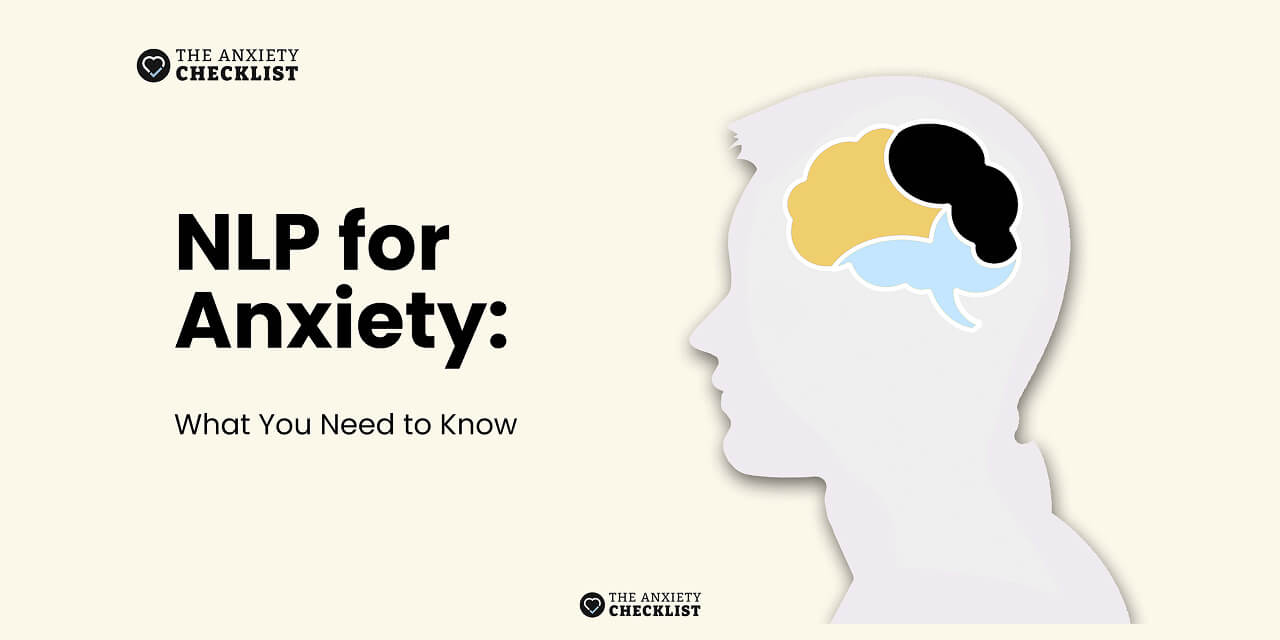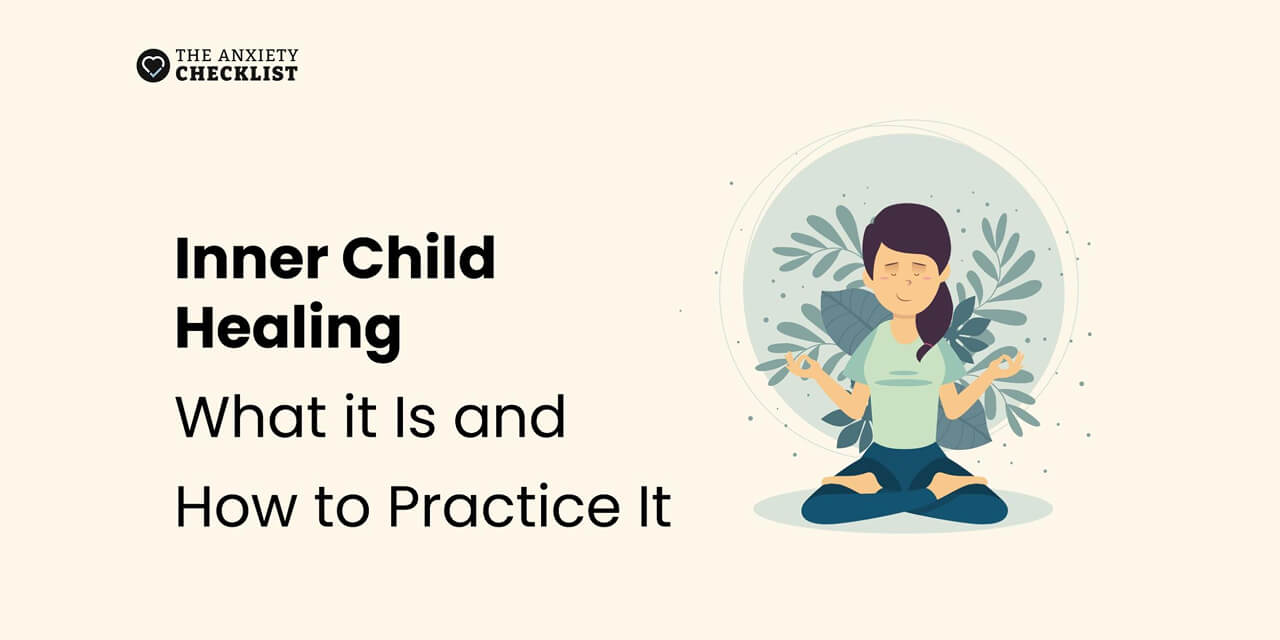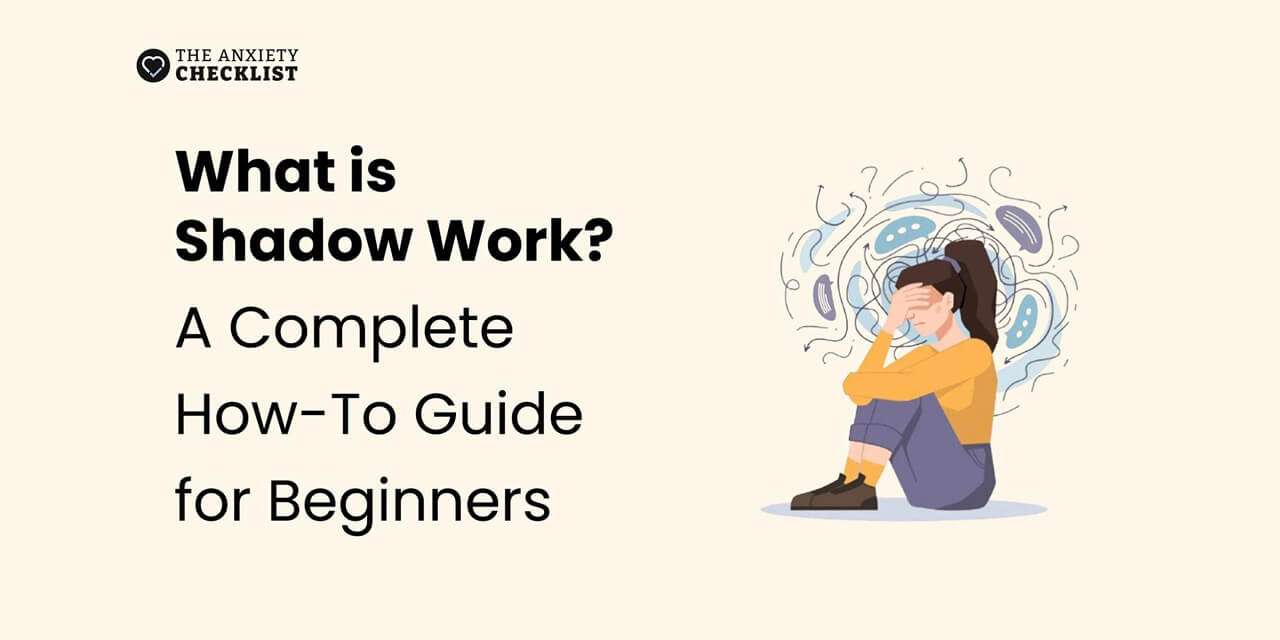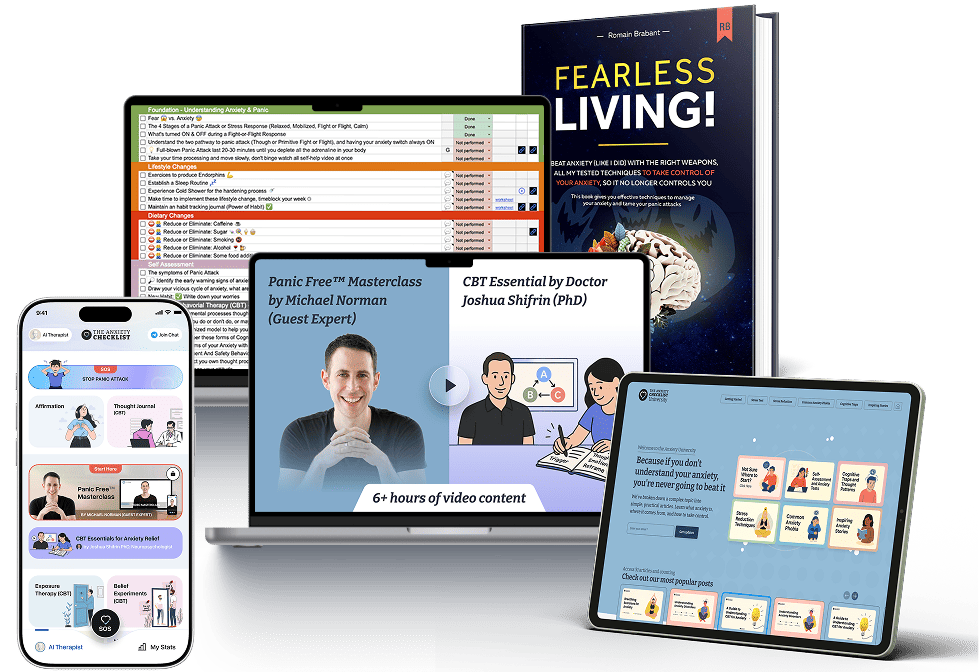When anxiety hits, do you know what to do next?
Learn how to calm your body, interrupt fear loops, and regain control step by step.
What is Neuro-linguistic Programming (NLP)?
- NLP is a fancy name, but really, it’s about how our brain, the words we use, and what we do all mix.
- When anxiety takes hold, it’s like these parts get tangled up and keep spinning the same worries.
- NLP helps sort that out by showing new ways to think and react — little shifts that can make a big difference. It’s not complicated, just a fresh way to get your head and heart on the same page.
- It’s like learning a new mental habit that works better.
History of Neuro-Linguistic Programming (NLP)
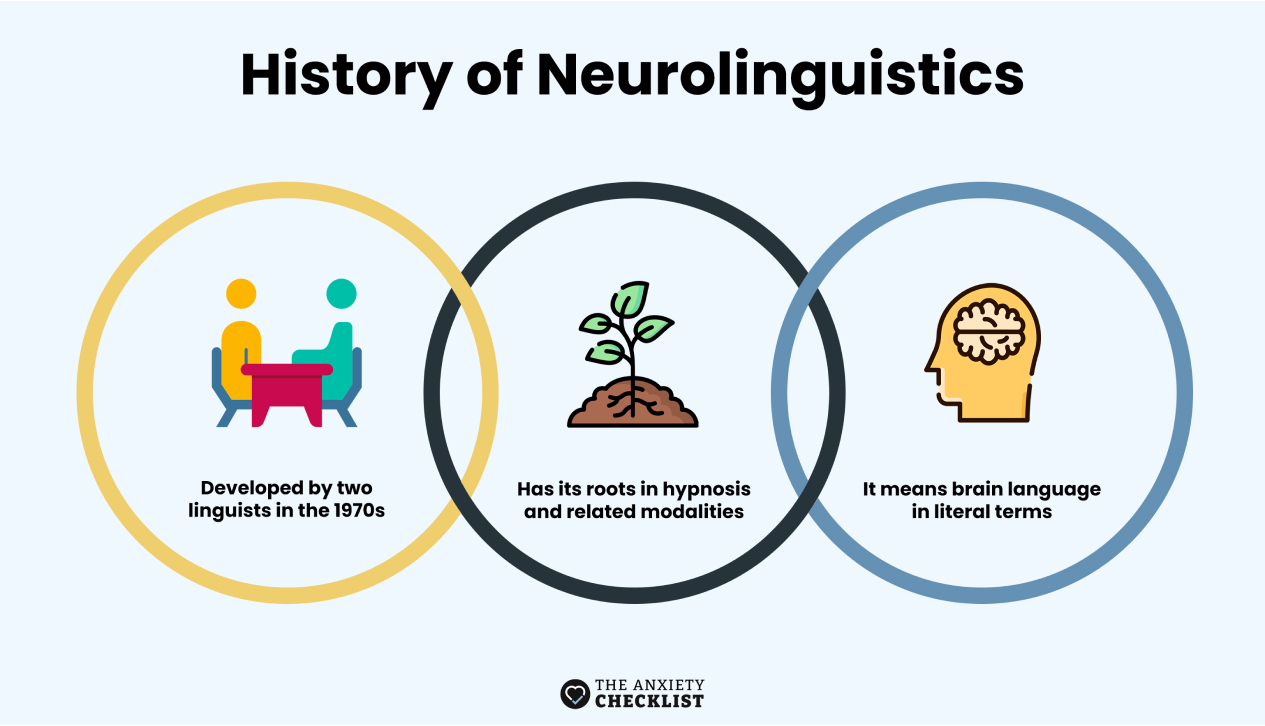
Did you ever stop to think how some therapists seem to get through to people so well? That’s exactly what Richard Bandler and John Grinder wanted to understand back in the early 1970s — and that curiosity sparked NLP.
Instead of guessing, they watched how these experts talked and worked with their clients. They noticed some common tricks and ways of thinking that seemed to really connect with people.
Putting those pieces together, they created a method that anyone could learn — that’s how NLP was born. The name comes from looking at the brain (neuro), language (linguistic), and the habits or programs we run in our minds (programming). It’s rooted in hypnotherapy and other related techniques.
Over time, NLP caught on beyond therapy, finding a place in coaching, business, and even sports. Some folks really swear by it for managing anxiety since it’s all about changing how the mind runs its “programs.”
How Neuro-linguistic Programming (NLP) Works
NLP taps into the way the brain organizes experience — it studies how thoughts and feelings form mental shortcuts.
Using NLP for anxiety is about working with the brain’s wiring. It’s about noticing the mental loops that cause anxiety and rewiring them step by step to ease anxiety and boost emotional resilience.
Here’s a rough idea of what happens in the brain (neurological processes) with NLP. It:
Why Use NLP for Anxiety: How it Helps
In the simplest terms, using NLP for anxiety helps transition you from a state of fear to a state of confidence and calm.
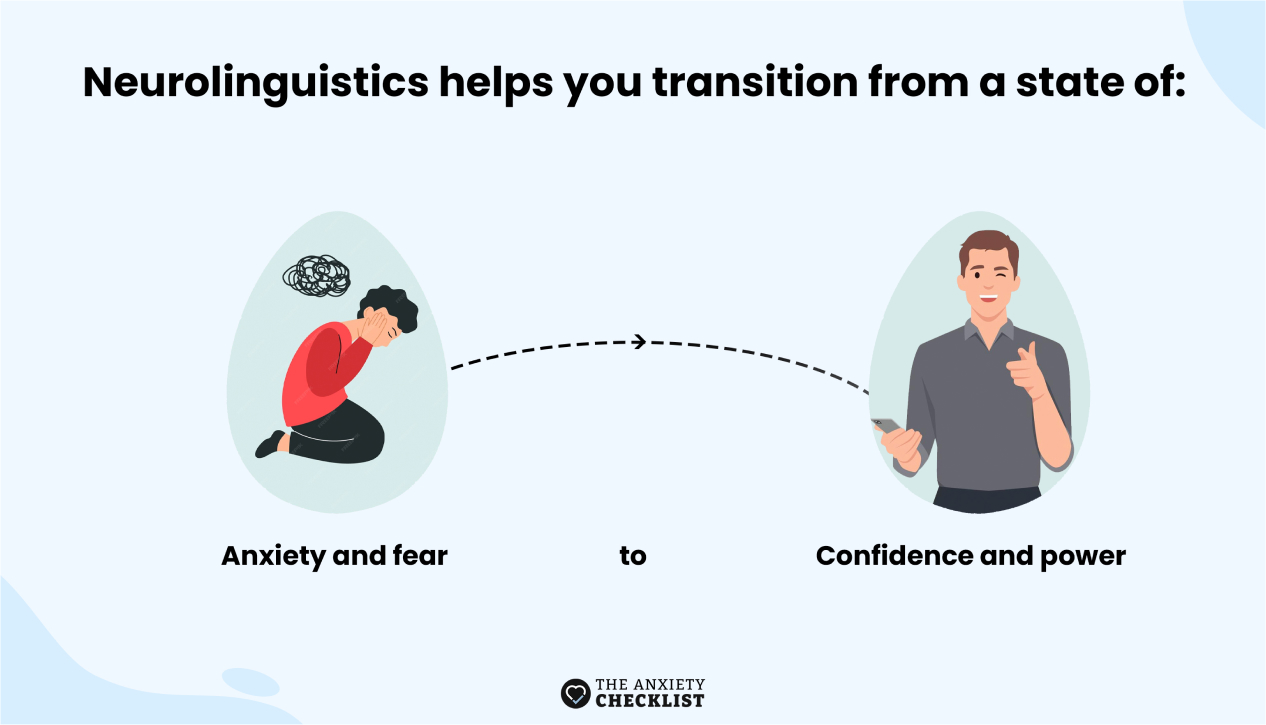
Ever lie awake at night with a mind full of worries, replaying every awkward moment or “what if” you can think of?
That’s anxiety talking loud. NLP is about turning down that volume.
NLP teaches you to spot those thoughts, almost like catching a habit before it takes over. Then, you learn how to shift that story — bit by bit — so it doesn’t run the show anymore.
Here are some clear and specific ways in which using NLP for anxiety can help.
Identifying Negative Thought Patterns
Using NLP for anxiety means first catching those pesky thoughts that sneak in uninvited. You know the ones. The “What if I fail?” or “Everyone’s judging me” kind of thoughts that show up on repeat, no matter what.
Here’s the tricky part: these thoughts often feel like facts. But they’re just stories our minds tell, and not always true.
Let’s break down a few common thought traps or cognitive distortions you can identify using NLP for anxiety.
Here’s a more detailed list of these thought biases.
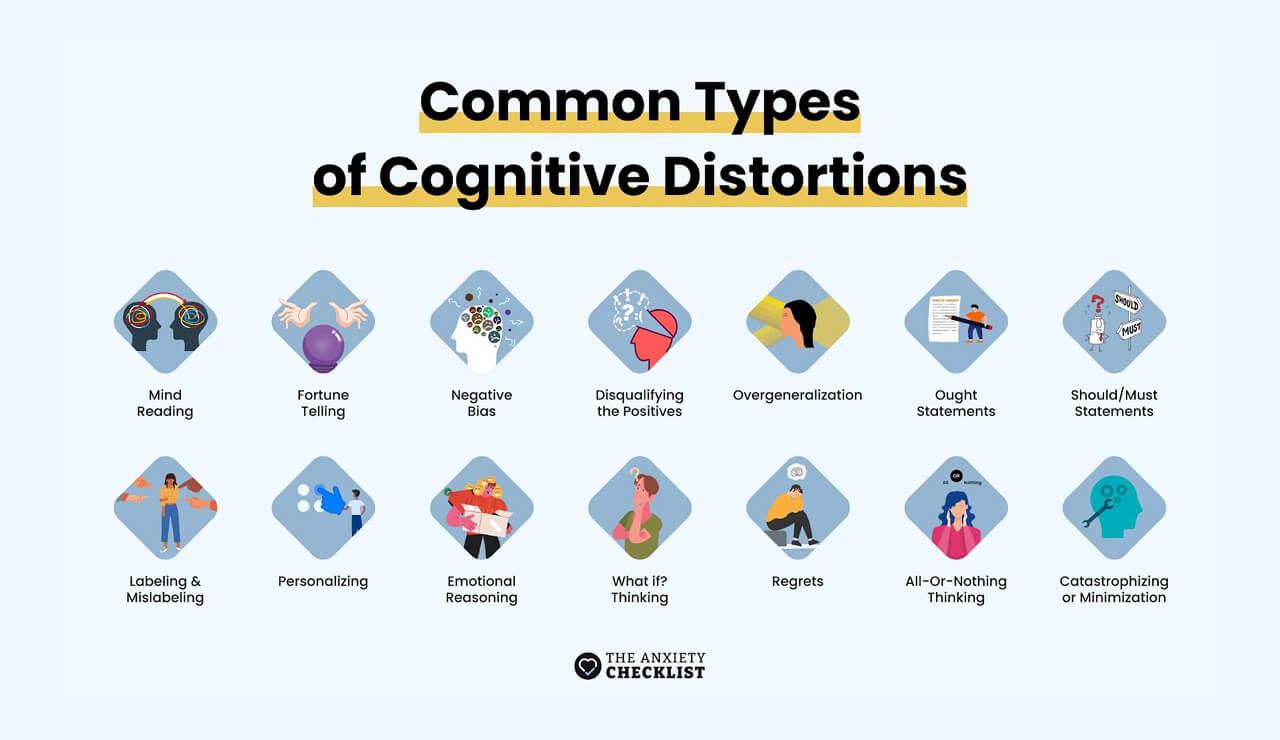
Using NLP for anxiety helps put those thoughts under a microscope. Suddenly, they don’t seem so big. They’re just thoughts — not the truth. And that’s a game-changer.
Reframing and Changing Perspectives
We all get those anxious thoughts that feel like they own us, right? Using NLP for anxiety is like learning how to be the boss of your thoughts.
When your brain say, “I can’t do this,” you don’t have to believe it. You can say, “Well, what if I can? What if I’m just nervous but capable?”
It’s not about ignoring the anxiety — more like giving your mind a chance to see the situation from a kinder place. You can also use affirmations for anxiety to help with thought reframing.
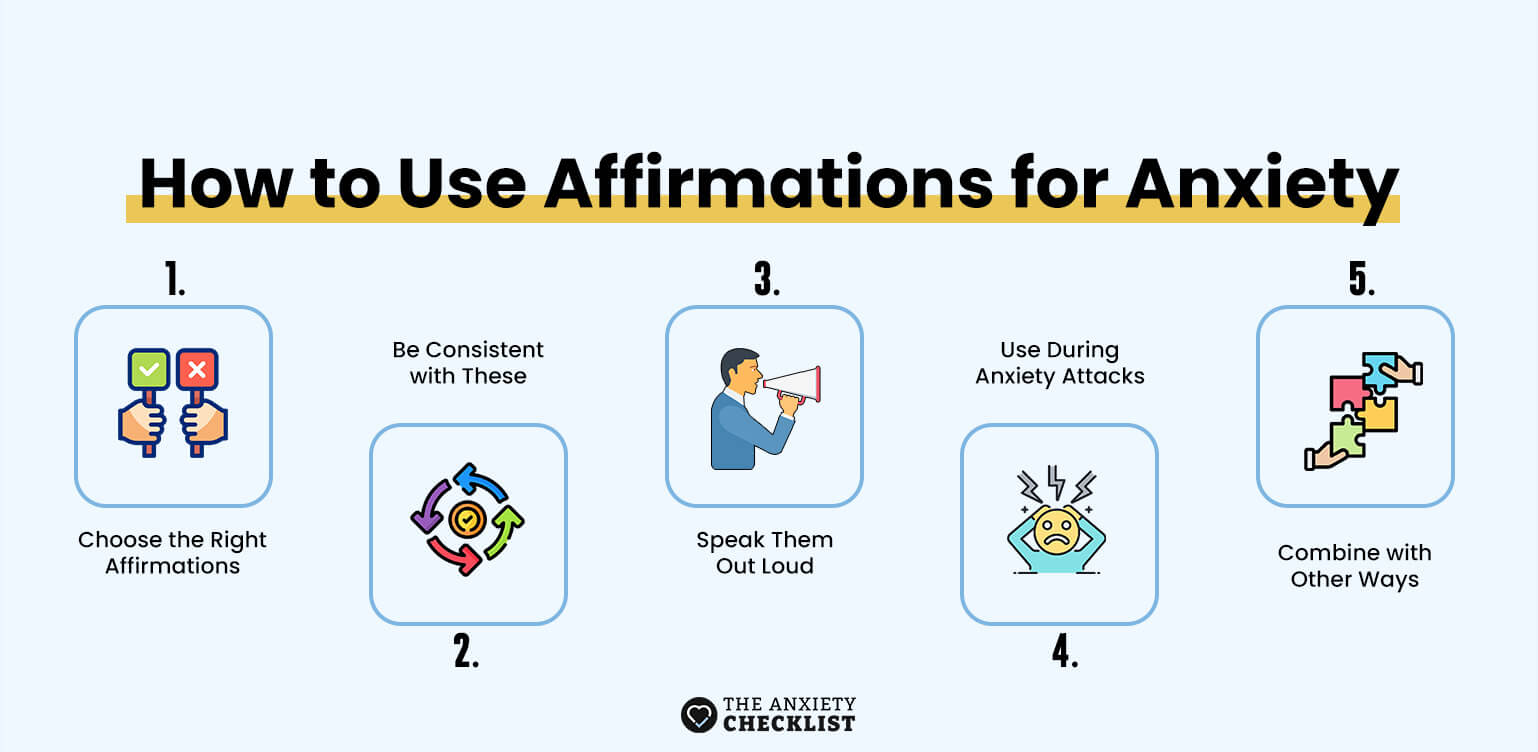
Anchoring Positive States
Have you ever gotten hit by a song or a smell and suddenly feel calm or happy? Like, it just takes you back? That’s kind of the magic behind anchoring, a common technique for using NLP for anxiety.
It’s the process of creating your own personal, physical trigger for a positive state. It's a way to hit the "calm" button when your brain wants to go into "freak out" mode.
Helping Visualize Positive Scenarios
Ever feel like your imagination is working against you? Using NLP for anxiety helps you turn that around.
The benefit is that you get to use your mind as a tool for calm instead of a source of fear. This works by actively imagining a feared situation going perfectly.
Remember:
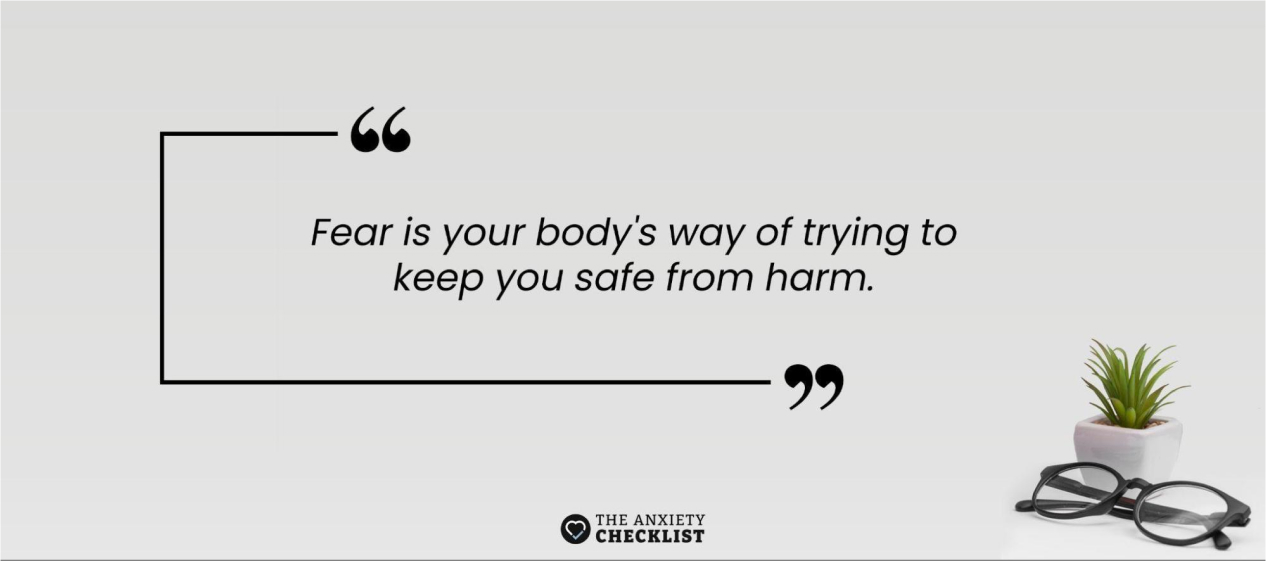
So, don't let it get you into a panic attack. Instead, use NLP techniques of visualization and future pacing to imagine positive future scenarios to overcome anxiety.
9 Effective NLP Techniques to Reduce Anxiety
Want to start using NLP for anxiety? Start with the following popular NLP techniques to help with anxiety disorders, post-traumatic stress disorder (PTSD), social anxiety disorder, and more.
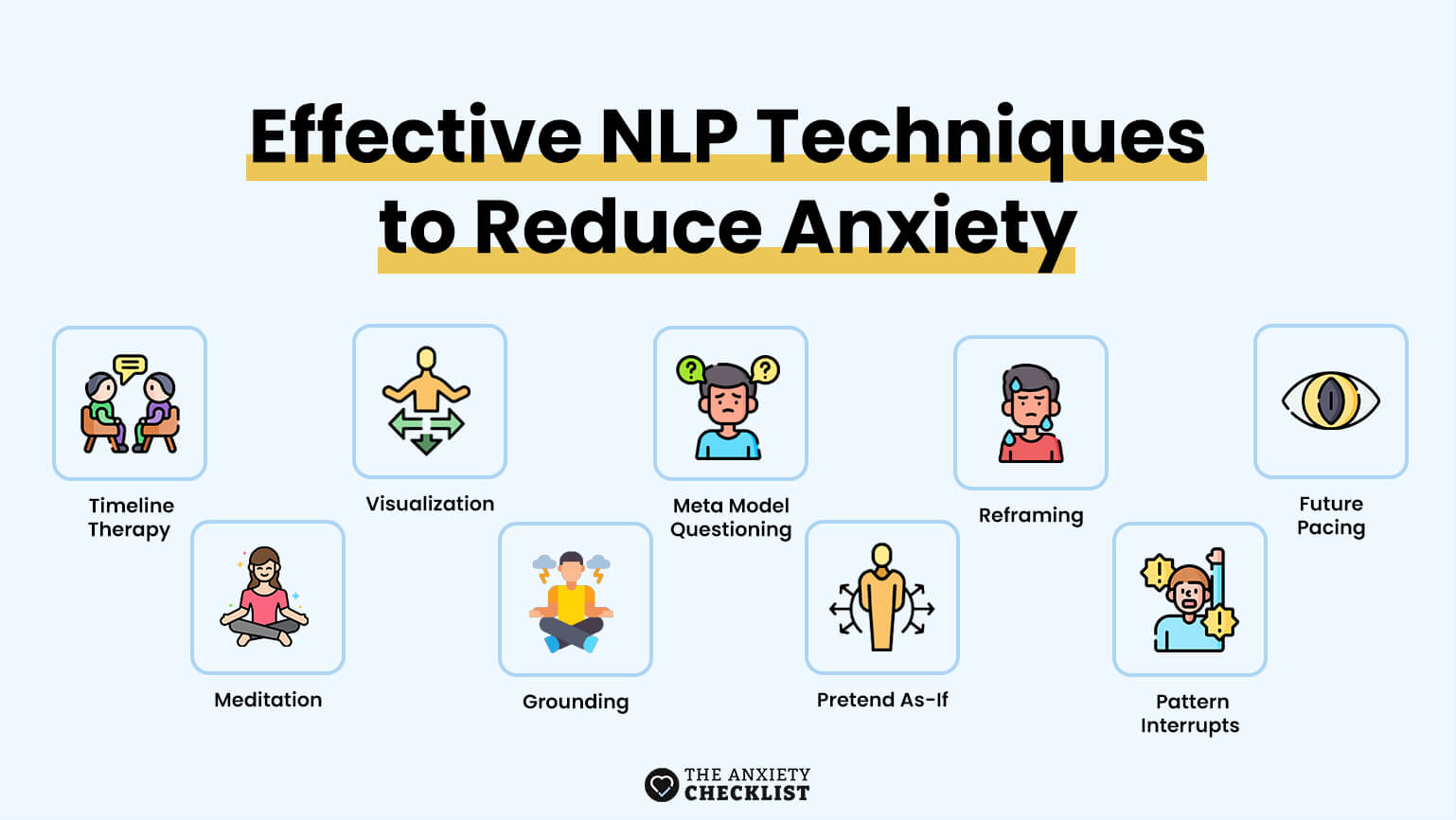
1. Timeline Therapy
If you’ve ever noticed how some anxious feelings seem tied to past events or memories, timeline therapy might help make sense of that.
Picture life stretched out as a line — the past trailing behind, the future stretching forward. Every anxious moment today is connected, in some way, to something that happened further back on that line.
Timeline therapy is about tracing that thread to its very start and gently changing how the mind holds it.
Here’s how it works in anxiety recovery to improve mental well-being.
You’re not deleting the memory. You’re changing its “charge.” So the next time something in the present tries to poke that same nerve, it’s not as raw.
Using NLP for anxiety with timeline therapy can:
Overall, it helps heal emotional wounds from the past and works even better with other techniques like inner child healing.
2. Meditation
Meditation is a powerful NLP tool that helps slow down the racing mind when anxiety takes over.
It’s not about emptying your head completely (which nobody can do anyway). Instead, it’s about focusing on something simple to bring your attention back to the present.
It can be something as simple as just sitting with your eyes closed and observing your breath. Of course, there are more advanced meditation exercises for anxiety management that you can try.
3. Visualization
Visualization is like giving your brain a little preview of the happy ending. Instead of getting stuck on the “what could go wrong,” you’re rewiring it to imagine the “what could go right.”
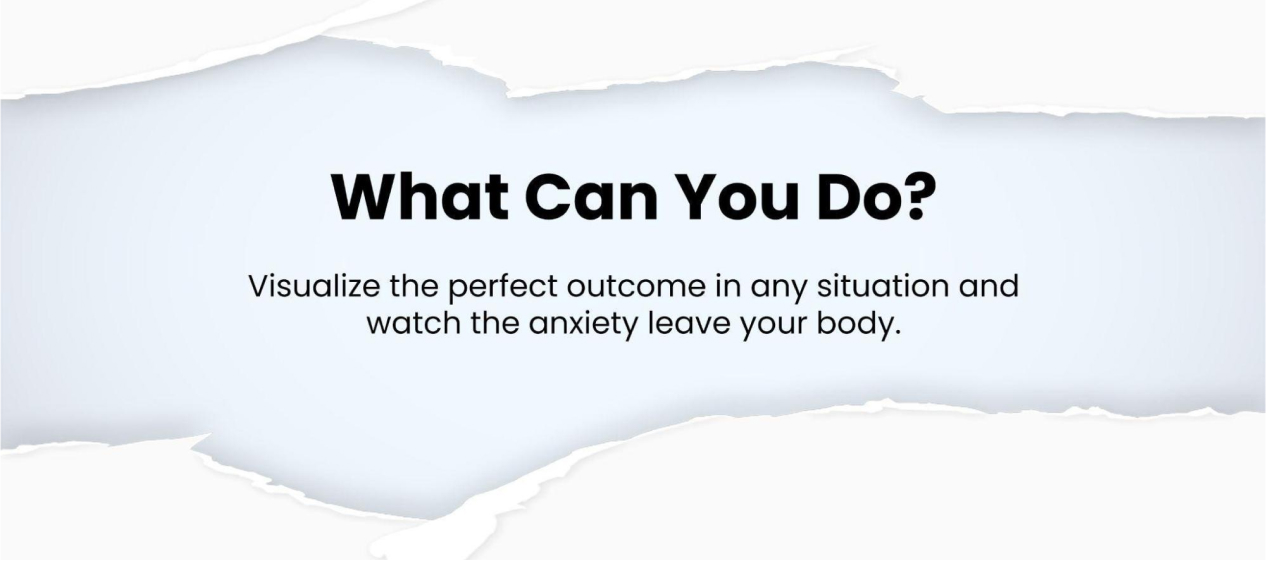
It’s like running the good version of a movie in your head before the actual showtime. The more you watch that positive movie, the less scary the real thing feels.
Here’s why it helps you build a more positive outlook. It:
4. Grounding
Grounding is a simple way to bring attention back to the present moment when the mind is racing. It’s one of the common ways of using NLP for anxiety.
Anchoring or grounding slows the flood of “what if” thoughts by focusing on real, physical sensations or surroundings.
Example: The 3-2-1 grounding exercise. Name three colors you see, two sounds you hear, and one thing you can touch.
Here are some more grounding techniques you can use.
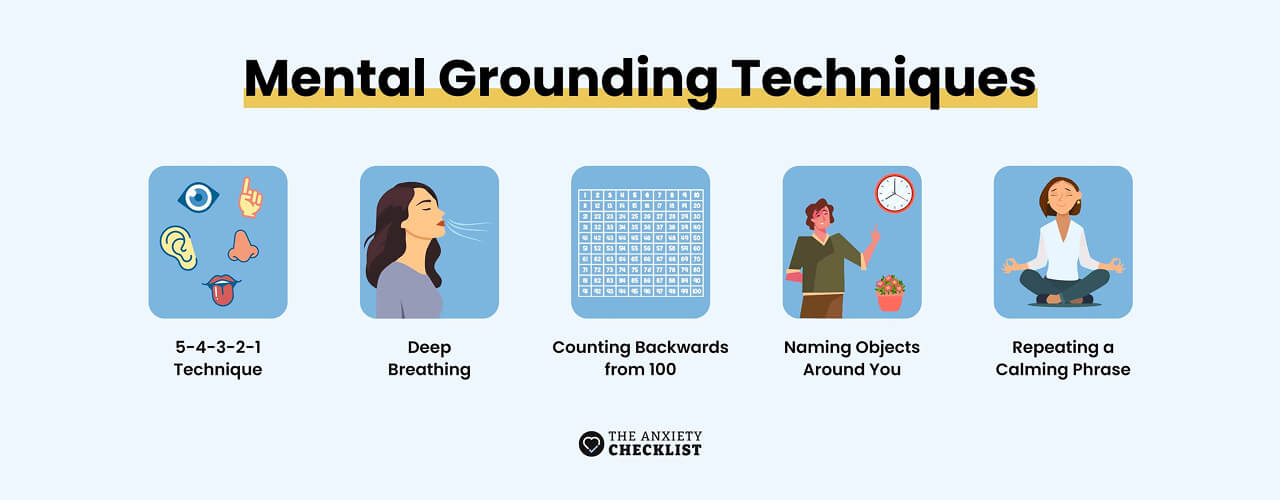
5. Meta Model Questioning
Anxiety loves to speak in broad, dramatic strokes — the kind of thoughts that sound certain but leave no room for logic. “I always mess things up.” “No one loves me.”
Meta Model Questioning is an NLP technique used for anxiety recovery. It works a bit like peeling an onion. You keep asking simple, targeted questions until you reach the core — and often find the fear wasn’t as solid as it seemed.
Using NLP for anxiety with the Meta Model Questioning technique can help you:
Example:
Imagine thinking: “I’m going to mess up the presentation.”
With Meta Model questioning, you might ask:
By the end of the questioning, the thought has less power and is easier to deal with.
6. Pretend As-If
Ever wish you could borrow the confidence of your future self? That’s pretty much the “Pretend As-If” technique. You act as if you’ve already handled the situation successfully — and your brain starts to follow along.
Here’s how it works:
Let’s understand it with some practical examples.
If you’re:
Over time, these “trial runs” teach your mind and body how to respond without panic. Using NLP for anxiety will help reduce occurrences of panic attacks in the long term, while also managing your anxiety.
7. Reframing
Reframing is one of the tools you can leverage when using NLP for anxiety.
It’s basically learning to see the same moment through a different lens. The situation doesn’t change — but shift the way you look at it, and suddenly the feeling it brings you can be completely different.
Here’s how you can use NLP for anxiety with the reframing technique:
Example:
Old frame: “Everyone at this event knows each other; I’m the odd one out.”
New frame: “I get to meet people who don’t know me yet — fresh start, no expectations.”
8. Pattern Interrupts
When anxiety shows up, it’s like watching the same scene in a film again and again — every movement, every word, exactly the same.
A pattern interrupt throws in an unscripted moment, something so different that the whole storyline changes in an instant.
How does it work when using NLP for anxiety?
Anxiety feeds on repetition. If you can interrupt the flow, even for a few seconds, your brain shifts focus, giving you a window to reset your emotional state.
Here are some examples of pattern interrupts:
In addition to using NLP for anxiety, you can also consider cognitive behavioral therapy (CBT), which also works in a similar way as thought reframing.
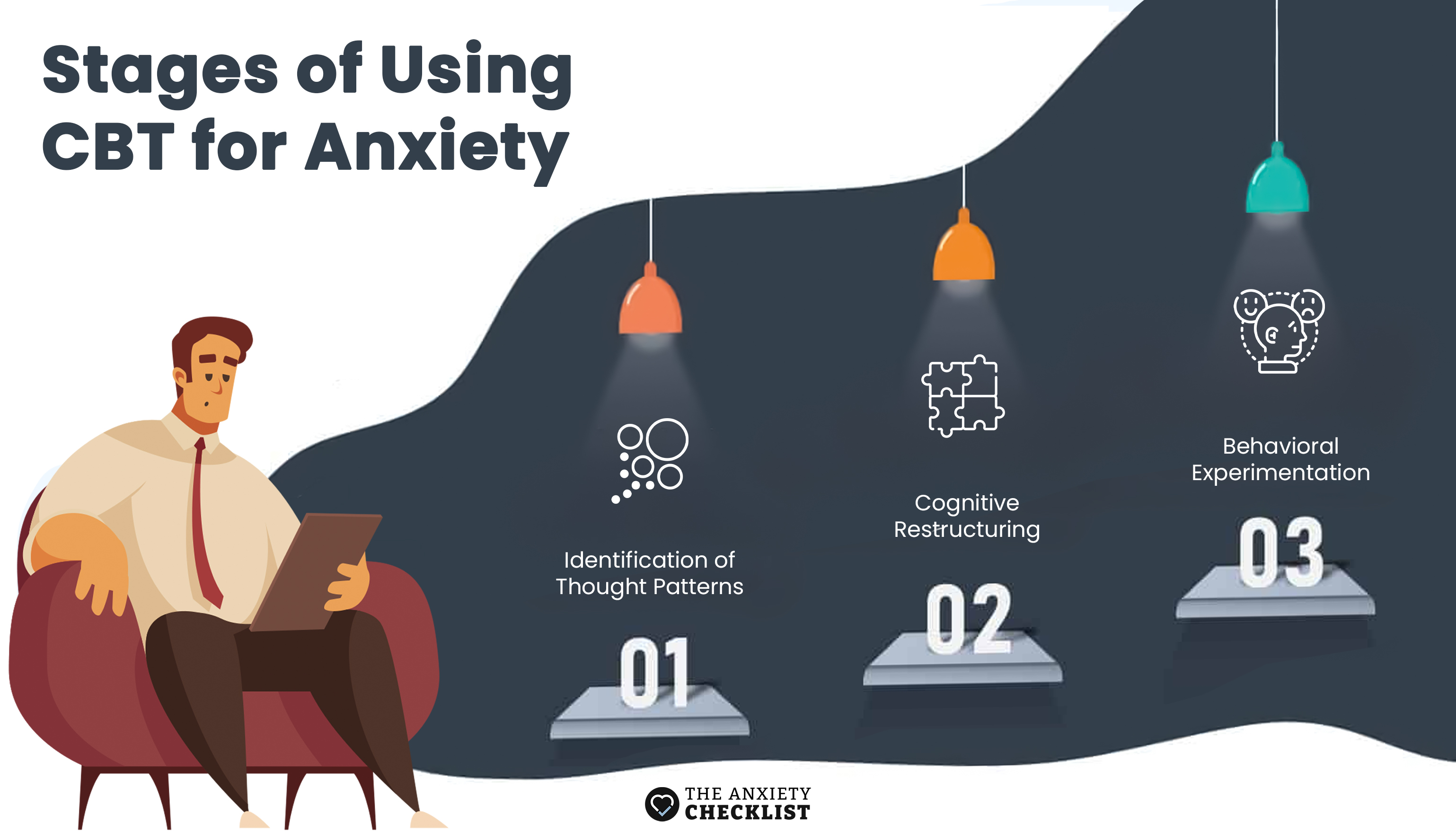
9. Future Pacing
Using NLP for anxiety isn’t always about digging into the past — sometimes, it’s about rehearsing the future.
Future pacing is like sending your mind a postcard from a future where you’ve already handled the situation well.
When anxiety tries to drag you toward the “What if it all goes wrong” version, you nudge it toward the “What if I’m okay?” version instead.
Here’s how it works:
Why it works for anxiety:
Frequently Asked Questions
Conclusion
If you are in a crisis or any other person may be in danger - don't use this site. These resources can provide you with immediate help.


